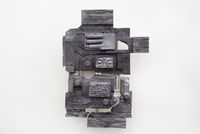Hong Kong-based multimedia artist Andrew Luk's practice examines, among other things, the representation of violence, the evolution of technology, and the often fraught relationship between humanity and nature. He is best known for his use of industrial materials such as perforated steel, spray foam, and concrete.
Read MoreBorn in 1988 in New Jersey and raised in Hong Kong, Andrew Luk earned a double degree in Fine Art and European History from the New England School of Art & Design and Suffolk University, both in Boston (2010). Luk's background in history has informed much of his work, including his use of politically charged materials such as napalm in his series 'Horizon Scan' (2017–ongoing). Mixing a makeshift version of the incendiary material (typically comprising a gelling agent and petrochemical), Luk torches canvas, wood, and copper with his home-brew before collaging the scarred scraps together and embalming them with epoxy resin inside LED lightboxes. The finished pieces resemble bird's-eye views of topographical maps or hypnotic studies of manmade destruction.
Another of Andrew Luk's notable sculptural series in which heat plays a critical role is 'Distilled of Fired Leaves' (2017–ongoing). These contorted sculptures are made from discarded air conditioner covers that Luk collects from around Hong Kong before burning the plastic casings with a blowtorch until they become warped and bubbled. Luk's interest in air conditioners in part lies in their use to delineate the boundary between nature and man-made dwellings. While the artist sometimes presents the objects jutting out from walls, one early iteration of the series was hung from the ceiling in the group exhibition The Garden at chi K11 art space in Clearwater Bay (2 September–13 October 2017) and resembled wilted, overripe fruits dangling from branches.
Andrew Luk cites as one of his main influences Paul Virilio, the late French theorist and philosopher whose writings were concerned with the violence of technology, progress, and consumption. Indeed, Luk's works are consistently supported by substantial historical and cultural theory; in 2017 and in collaboration with Alexis Mailles and Peter Nelson, Luk produced Autosave: Redoubt: a video game rooted in their research into local wartime history and the contemporary use of video games for military training. Built within the existing program Counterstrike: Global Offensive, Autosave is a first-person shooter simulation in which players navigate still-standing bunkers and tunnels used by the British military during the 1941 Battle of Hong Kong, complete with newsreel and musical samples from the era.
In the summer of 2017, Andrew Luk undertook a residency at de Sarthe Gallery, during which time he used the gallery's exhibition space as a studio. The residency culminated in the solo exhibition Practice (2–9 September). On one wall, the large-scale aluminium fresco Compression Lifting (2017) from Luk's ongoing 'Chronicle Compression' series was a meticulous act of preservation, made from taking rubbings from the textures of an old freight elevator. The focal point of the show, however, was Black Square Problem Setting (we're talking about practice) (2017): a towering black structure studded with irregular grey shapes that acted as a functional climbing wall. Luk made the climbing holds by casting found objects in clay moulds, into which he poured fibreglass resin and aquarium sand. Interested in the social negotiations that the sport requires, he asked experienced climbers to design and mark the routes with coloured tape.
In September 2019, Andrew Luk presented an enormous inflatable PVC sculpture propped against an outdoor wall as part of the exhibition Very Natural Actions at Tai Kwun (22 September–31 December 2019). Titled Eventual Responder (2019), the work is a to-scale replica of an airplane emergency evacuation slide. 'It's an object that exists in everyone's minds but nobody has ever seen, making for a combination of joy and horror,' Luk described. The slide is also a nod to childhood play, which Luk considers conditioning for real-world high-stress situations, saying: 'Playing house teaches children patterns of domesticity; playing tag is a way to avoid the child abductor while dodgeball is a primitive way of avoiding projectiles. Swings and slides get the body used to speed and acceleration; the body responds intuitively from either muscle memory or fast-firing synapses.'
Biography by Elliat Albrecht | Ocula | 2020




